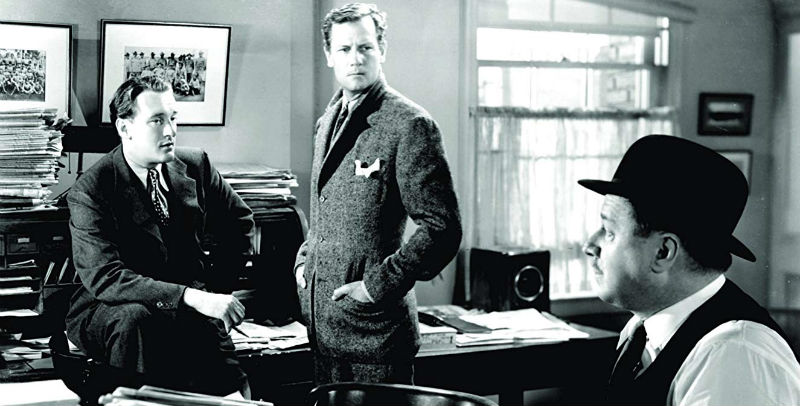Ranking, analyzing, and celebrating the 106 greatest crime films of all-time. Catch up on the series and find new installments daily here.
__________________________________
FOREIGN CORRESPONDENT (1940)
__________________________________
TYPE OF FILM: Espionage
STUDIO: United Artists
PRODUCER: Walter Wagner
DIRECTOR: Alfred Hitchcock
SCREENWRITERS: Charles Bennett, Joan Harrison; dialogue by James Hilton and Robert Benchley
SOURCE: Original screenplay
RUNNING TIME: 119 minutes
PRINCIPAL PLAYERS:
Joel McCrea … Johnny Jones/ Huntley Haverstock
Laraine Day … Carol Fisher
Herbert Marshall … Stephen Fisher
George Sanders … Scott ffolliott
Albert Basserman … Van Meer
Robert Benchley … Stebbins
Edmund Gwenn … Rowley
Eduardo Ciannelli … Krug
Harry Davenport … Mr. Powers
__________________________________
DID YOU KNOW?
__________________________________
The love scene aboard the ship during the violent North Sea storm was taken from Hitchcock’s own life. Although the script was completed, Hitchcock added the scene in which the Joel McCrea character asks the Laraine Day character to marry him. There is nothing fancy about the scene, no sappy cliches and such, just the same straightforward proposal that Hitchcock made to Alma fifteen years earlier: McCrea: “I’m in love with you and I want to marry you.” Day: “I’m in love with you, and I want to marry you.” McCrae: “That cuts down our love scene quite a bit, doesn’t it?”
__________________________________
THE STORY
__________________________________

At the beginning of 1939, John Jones, an American newspaper reporter, is sent to Europe under the name Huntley Haverstock. His mission is to learn more about the possibility of war, mainly by interviewing Van Meer, a Dutch diplomat who has committed to memory a key secret element in the Allied Peace Treaty. Jones meets Stephen Fisher, a member of the British upper class who is the head of a pacifist organization, and his daughter Carol, with whom Jones quietly falls in love. When Van Meer is kidnapped by foreign agents, Jones goes to Holland to find him. At a meeting in Amsterdam Square, Van Meer doesn’t seem to recognize Jones and is shot and killed, while the assassin disappears in a sea of black umbrellas. With Carol and ffolliott, a British correspondent, Jones pursues the killer to a windmill in the Dutch countryside, which is the headquarters of a foreign spy ring.
Jones sends ffolliott for help, and finds a drugged Van Meer, proving that the murdered man was a lookalike imposter. The spies flee before the authorities return, so Jones goes back to London, where he goes to see Fisher. During the visit, Jones recognizes one of the men from the windmill. He realizes that Fisher is a traitor, and with ffolliott’s help, he rescues Van Meer.
When war is declared between England and Germany, Carol and her father get on a plane for America and are surprised to meet Jones and ffolliott. The plane is shot down over the Atlantic, and Fisher, knowing he has been found out and facing arrest in America, sacrifices his life to save his daughter. An American ship rescues them, and Jones is able to report the story to his newspaper.
***
Producer Walter Wagner had purchased the rights to Personal History, the memoirs of foreign correspondent Vincent Sheean, and planned to make an important and timely film about the crisis in Europe, but he ran into endless problems—frequently of his own making—along the way. Numerous screenplays were rejected because they lacked plot and drama, and he couldn’t get financing because of fears that the film might compromise America’s position of neutrality.
He was eventually able to make a deal with David O. Selznick to borrow Alfred Hitchcock to direct. Hitchcock, his wife, Alma, Charles Bennett, and longtime collaborator Joan Harrison put together a script that was workable but had no similarity to the book, nor was it the anti-Nazi film Wagner had envisioned. Wagner wanted to see each development in the European crisis in the script. Hitchcock assured him this would be so, showing him the daily rushes, which pleased Wagner, and the show went on. In fact, Hitchcock added nothing to the script, and the film remains only mildly political, being transformed into a romantic adventure film with many comic moments. Only its ending, written by Ben Hecht and out of step with the rest of the film, urges America to be prepared. Five days after the last scene was shot. Germany dropped bombs on London. Ironically, the film was reported to be a personal favorite of Hermann Goering.
Foreign Correspondent was nominated for an Oscar for Best Picture, losing to another Hitchcock film, Rebecca. It also received other nominations, including several for technical categories, as well as one for Albert Basserman as Best Supporting Actor.
Hitchcock had wanted Gary Cooper to play Johnny Jones but was turned down because Cooper claimed thrillers were held in low regard. Years later, he told Hitchcock that he had made a mistake and should have taken the role.
__________________________________
BEST LINE
__________________________________
Mr. Powers, the editor of the New York Morning Globe, is disgusted with his foreign correspondents for failing to send any hard news to the paper and decides that he wants a real reporter to go to Europe, selecting the charming if slightly dim Johnny Jones, who admits that he knows nothing about Europe or any crisis. “What Europe needs,” Power exclaims, “is a fresh, unused mind.”


















